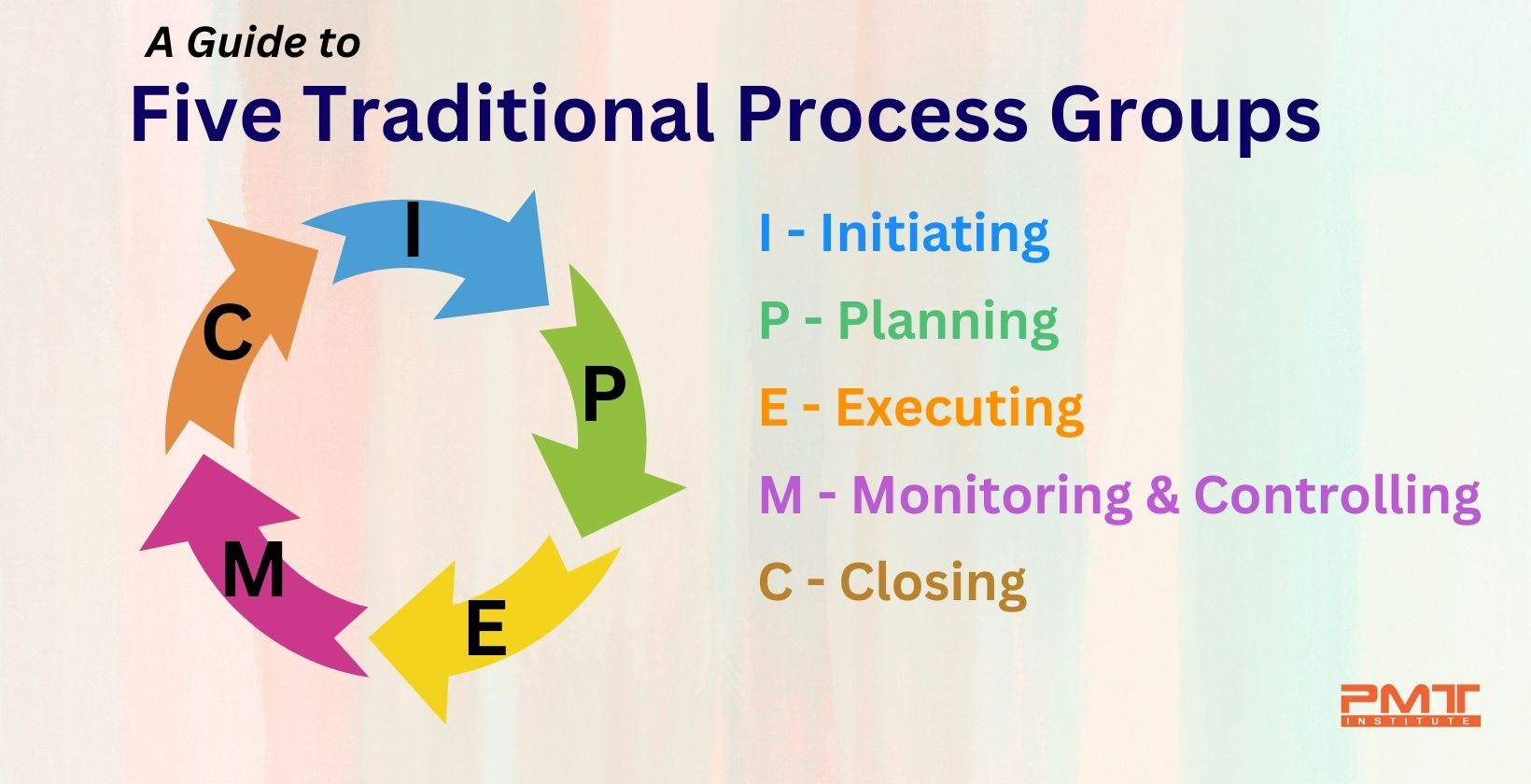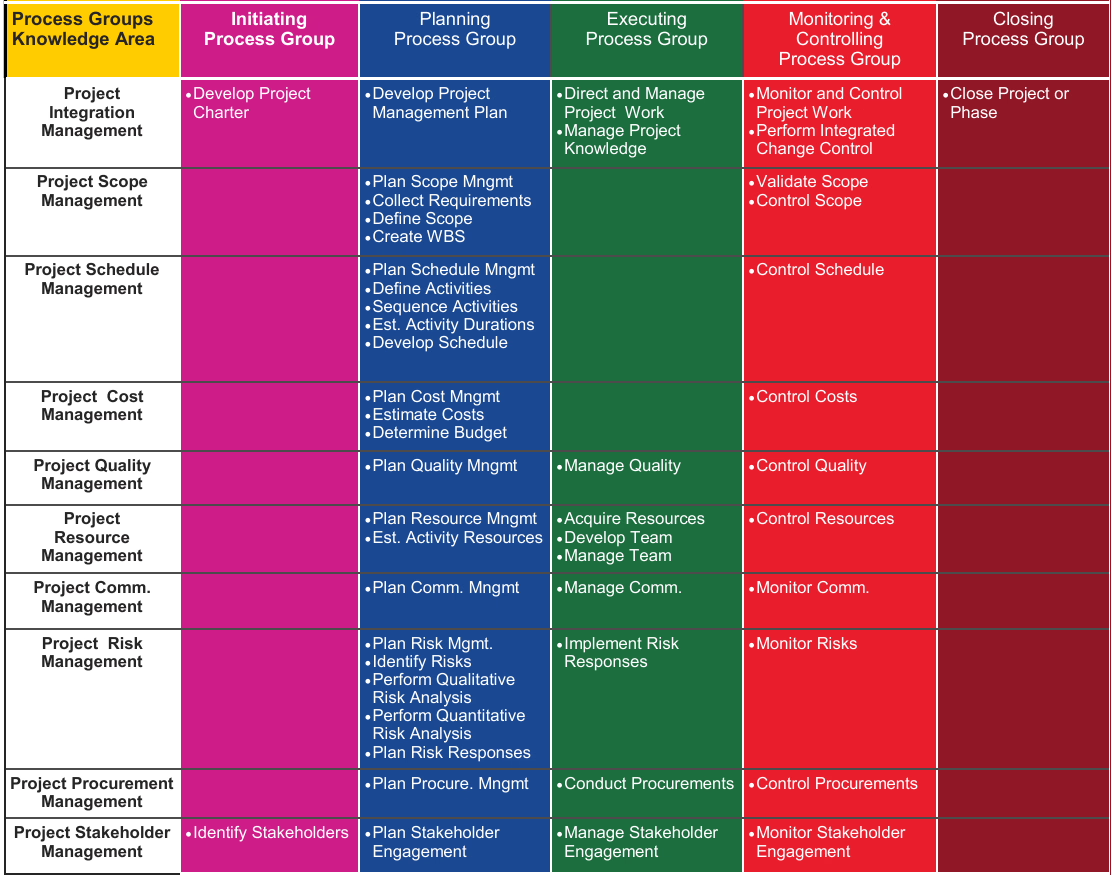A guide to Five Traditional Process Groups
Published:
Updated:

Project management is a multifaceted discipline that requires a systematic and strategic approach to successfully navigate the intricacies of planning, executing, and closing projects. At the core of project management methodology lie the five traditional process groups, a well-established framework endorsed by the Project Management Institute (PMI). These process groups serve as the essential building blocks that guide project managers and teams through the various stages of project development, ensuring clarity, structure, and efficiency in project execution.
Key Takeaways
- Comprehensive Overview: Learn about 5 essential process groups in project management: Initiating, Planning, Executing, Monitoring, Controlling, and Closing.
- Detailed Breakdown: Understand the specific activities involved in each process group, such as project charter creation, scope definition, and performance measurement.
- Practical Insights: Each client and project is unique; flexibility ensures better alignment with client expectations and project goals.
- Essential for PMP: A must-read for PMP seekers to grasp the foundational elements of project management according to PMBOK standards.
In this in-depth blog, we will delve into each of the five traditional process groups, providing aspiring project managers and industry professionals with an extensive resource to comprehend their significance and implementation. Each process group encompasses a distinct set of activities and best practices that collectively contribute to the seamless execution and delivery of projects.
As we explore the nuances of each process group, readers will gain valuable insights into how project managers employ these methodologies to effectively initiate projects, develop robust plans, execute tasks with precision, monitor progress, and ultimately conclude projects with success.
We will explore not only their fundamental principles but also how they intertwine and complement each other. Readers will discover that these process groups are not isolated silos but interconnected elements of a cohesive project management approach that fosters collaboration, transparency, and alignment throughout the project's lifecycle.
Initiating Process Group
The Initiating Process Group is the starting point of any project. During this phase, project managers and key stakeholders identify the project's purpose, scope, and objectives. The primary goal of this process group is to define the project and obtain authorization to proceed. Key activities within the Initiating Process Group include:
Project Charter Creation
The project charter is a critical document that formally authorizes the project's existence and defines its high-level objectives, stakeholders, and initial requirements. It also identifies the project manager and outlines their authority to allocate resources and make decisions.
Stakeholder Identification and Analysis
Identifying and understanding project stakeholders is vital for project success. Stakeholder analysis helps project managers determine the interests, expectations, and influence of various stakeholders, enabling effective communication and engagement throughout the project's lifecycle.
Feasibility Studies
Assessing the project's feasibility involves evaluating its technical, financial, and organizational viability. Feasibility studies help project managers and stakeholders determine whether the project is worth pursuing and aligns with the organization's strategic goals.
Planning Process Group
The Planning Process Group is a comprehensive phase where project managers develop detailed plans to guide project execution effectively. This group focuses on defining the project scope, creating a realistic schedule, and identifying resources needed to achieve project objectives.
In the PMBOK® Guide, PMI outlines twenty-four distinct processes for planning. Although project teams have the flexibility to select processes based on project needs, the underlying message emphasizes the significance of planning to avoid failure. Many organizations initiate projects with minimal planning, assuming that things will align naturally. Yet, the absence of robust planning frequently leads to disorder and challenges. Key activities within the Planning Process Group include:
Scope Definition and Management
Defining the project scope involves specifying the project's boundaries, deliverables, and objectives. Scope management ensures that the project remains on track and prevents scope creep, which can lead to schedule delays and budget overruns.
Work Breakdown Structure (WBS) Creation
The WBS is a hierarchical representation of project deliverables and activities. It breaks down the project into manageable components, enabling better resource allocation, task assignment, and progress tracking.
Schedule Development
Developing a project schedule involves estimating the time required to complete each task and creating a timeline for project activities. Scheduling tools and techniques, such as Gantt charts and network diagrams, aid project managers in visualizing the project timeline and critical path.
Resource Planning
Identifying and securing the necessary resources, including personnel, equipment, and materials, is crucial for project success. Resource planning ensures that the project has the right resources at the right time, minimizing bottlenecks and delays.
Risk Identification and Management
Risk management is essential for proactively identifying potential threats and opportunities that may impact the project. Project managers develop risk mitigation strategies to minimize negative impacts and leverage opportunities for project advancement.
Executing Process Group
The Executing Process Group involves the implementation of project plans and the execution of project tasks. During this phase, project managers coordinate and direct team members to accomplish project objectives efficiently. Key activities within the Executing Process Group include:
Team Mobilization
Project managers assemble and mobilize the project team, assigning roles, responsibilities, and tasks to individual team members. Effective team mobilization fosters collaboration and ensures that each team member understands their contribution to the project's success.
Quality Assurance and Quality Control
Ensuring quality throughout the project is vital for delivering satisfactory results. Quality assurance activities involve setting quality standards and processes, while quality control focuses on monitoring project deliverables to meet those standards.
Communication Management
Effective communication is fundamental for project success. Project managers establish communication channels and protocols to facilitate information flow among team members, stakeholders, and external parties.
Procurement Management
If the project requires external resources, project managers engage in procurement management to identify, select, and contract with suppliers. This process ensures that the necessary resources are acquired promptly and at the best possible terms.
Monitoring and Controlling Process Group
The Monitoring and Controlling Process Group involves continuous oversight of project activities to ensure they align with the project plan and objectives. This phase enables project managers to identify deviations and take corrective actions when needed. Key activities within the Monitoring and Controlling Process Group include:
Performance Measurement
Project managers assess project performance against planned objectives and milestones. Performance measurements allow project teams to identify areas of improvement and make data-driven decisions.
Change Management
Projects are susceptible to changes in scope, requirements, or external factors. Change management ensures that any changes are carefully evaluated, approved, and integrated into the project plan.
Risk Monitoring
Continuous risk monitoring allows project managers to track the status of identified risks and assess their impact on project progress. Timely risk responses help mitigate potential issues and maintain project momentum.
Issue Management
Issues arise in every project, and project managers must promptly address them to prevent escalation. Effective issue management involves root cause analysis and the implementation of corrective actions.
Closing Process Group
The Closing Process Group marks the end of the project and ensures a smooth transition to project completion. During this phase, project managers close all project-related activities and deliver the final product to stakeholders. Key activities within the Closing Process Group include:
Formal Project Acceptance
Project deliverables are reviewed and validated against the project scope and requirements. Once all project outputs meet the agreed-upon standards, formal acceptance is obtained from stakeholders.
Lessons Learned
Project teams conduct a comprehensive lessons-learned session to document successes, challenges, and best practices encountered throughout the project. These insights serve as valuable knowledge for future projects.

Project Documentation and Archiving
All project documentation, including the project charter, plans, and reports, are archived for future reference and compliance purposes. Proper documentation ensures that project data is accessible for historical analysis and auditing.
The benefits of PMBOK process groups
The advantages of utilizing PMBOK process groups lie in their ability to facilitate a thorough project planning journey, spanning project initiation to conclusion, resulting in a comprehensive project management blueprint. These process groups furnish a versatile framework applicable to diverse projects, ensuring optimal resource utilization consistently.
Proficient project managers recognize the interplay among the five process groups, leveraging this comprehension to steer their projects toward achievement. A profound understanding of the nuanced workings within these processes constitutes a highly prized skill in the realm of project management.
Final Thoughts of Traditional Group Process
As the project management landscape evolves with technological advancements, market demands, and global challenges, a comprehensive understanding of these process groups is essential to becoming a good project manager. The ability to leverage the five traditional process groups enables project managers to adapt swiftly to changing circumstances, navigate uncertainties, and deliver optimal outcomes that meet stakeholders' expectations and organizational goals.
By implementing these process groups effectively, project managers can steer projects toward success and achieve optimal results that meet stakeholders' expectations and organizational goals.


